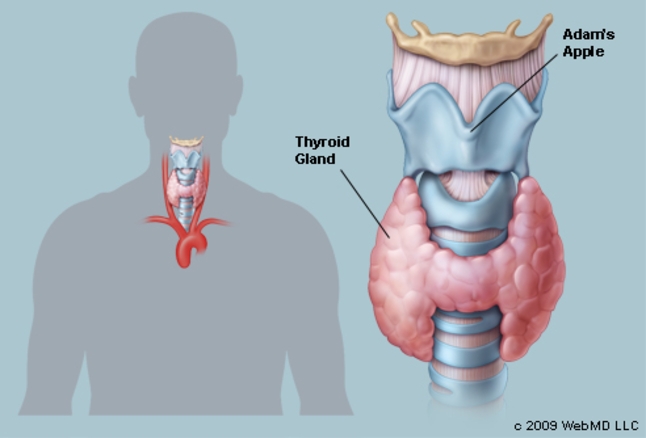Understanding Thyroid
The thyroid is a butterfly-shaped gland that sits low on the front of the neck. Thyroid lies below the Adam’s apple, along the front of the windpipe. It has two side lobes, connected by a bridge (isthmus) in the middle. When the thyroid is in its normal size, it can’t be felt.
Brownish-red in color, the thyroid is rich with blood vessels. The thyroid secretes several hormones, collectively called thyroid hormones. Thyroxine is the main hormone, also known as T4. Thyroid hormones act throughout the body, influencing metabolism, growth and development, and body temperature. During infancy and childhood, adequate thyroid hormone is crucial for brain development.
What Causes Thyroid Problems?
All types of hyperthyroidism are due to an overproduction of thyroid hormones, but the condition can occur in several ways:
- Graves' disease: production of too much thyroid hormone.
- Toxic adenomas: secretion of thyroid hormones due to the development of nodules in thyroid gland upsetting the body's chemical balance; some goiters may contain several of these nodules.
- Subacute thyroiditis: Inflammation of the thyroid that causes the gland to "leak" excess hormones, resulting in temporary hyperthyroidism that generally lasts a few weeks but may persist for months.
- Pituitary gland malfunctions or cancerous growths in the thyroid gland: Although such cases are rare, hyperthyroidism can also develop from these causes.
Hypothyroidism , by contrast, stems from an underproduction of thyroid hormones. Since your body's energy production requires certain amounts of thyroid hormones, a drop in hormone production leads to lower energy levels.
Following are the causes of hypothyroidism:
- Hashimoto's thyroiditis : In this autoimmune disorder the production of hormones gets stopped by attacking the thyroid tissue of the body, the body attacks thyroid tissue. The tissue eventually dies and stops producing hormones.
- Removal of the thyroid gland: The thyroid may have been surgically removed or chemically destroyed.
- Exposure to excessive amounts of iodide: Cold and sinus medicines, the heart medicine amiodarone, or certain contrast dyes given before some X-rays may expose you to too much iodine. You may be at greater risk for developing hypothyroidism if you have had thyroid problems in the past.
- Lithium: This drug has also been implicated as a cause of hypothyroidism.
If untreated for long periods of time, hypothyroidism can bring on a myxedema coma, a rare but potentially fatal condition that requires immediate hormone treatment.
Quickobook is here to help you get the best diagnosis in your very own city. Don’t worry!! Book an appointment today if you are facing any of these symptoms. We are available to serve you better.









Comments (0)
No comments yet. Be the first to share your thoughts!
Leave a Comment